CULINARY GAME CHANGER
Growing food, growing people – the miracle of Bonakude
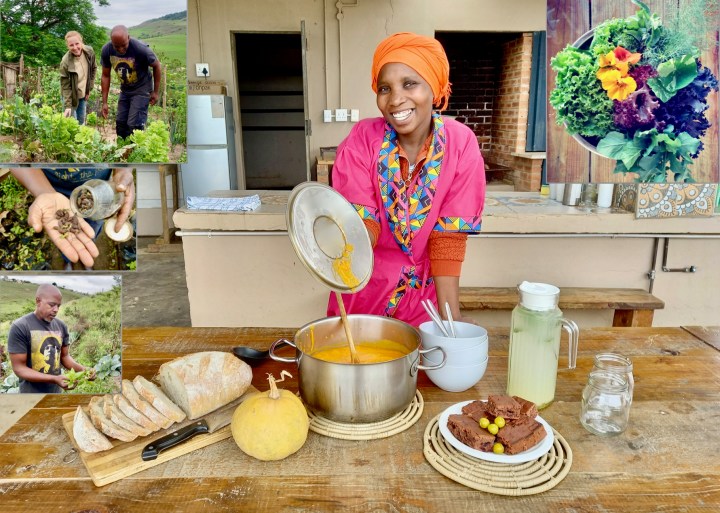
In four short years, Prof Mvu Ngcoya and Linda Lazarczyková, stirred by passion and commitment, have turned an inhospitable farm plot in rural KZN into a model of transformation and delicious, nutritious food. Be in charge of your plate, be in charge of your freedom?
When Professor Mvuselelo “Mvu” Ngcoya was growing up in Phatheni, a long-neglected, impoverished rural community not far from the KwaZulu-Natal town of Richmond, there was no Bonakude farm. No hope.
“You knew only that this was not a place for you to live, but to leave. Everybody had this idea, you’re just here for a temporary stay and the sooner you get away the better, because there are no prospects at all.”
He left as soon as he could. And travelled. Via a circuitous academic route that saw him get his PhD and teach for a time at the American University in Washington, DC. His doctoral dissertation was on ubuntu and its relevance to international politics.
“Doing research on this indigenous philosophy, I developed an interest in other things indigenous.”
In 2010, back in South Africa, he took up a teaching post in the School of Built Environment and Development Studies (Sbeds) at the University of KwaZulu-Natal in Durban. Research on indigenous plants became a focus. This connected him to people working with indigenous food.
“And that is how I made the transition from international politics to food politics.”
Like a lot of rural kids, he says, he had learned to work the land.
“Begrudgingly! Because this is what your parents expected of you. When you’re not at school you’re outside, weeding, planting, and if there are cattle, you’re looking after them and the other animals.”
But then you leave. You stop. He left. He stopped.
Until the focus of his research became agriculture and the trouble small-scale farmers have across South Africa, across Africa, making ends meet.
“I spent a lot of my time travelling through northern KZN talking to farmers who were cultivating indigenous crops. All of them would ask me, ‘What do you grow?’ And I wasn’t growing anything. So it became this nagging thing at the back of my mind…”
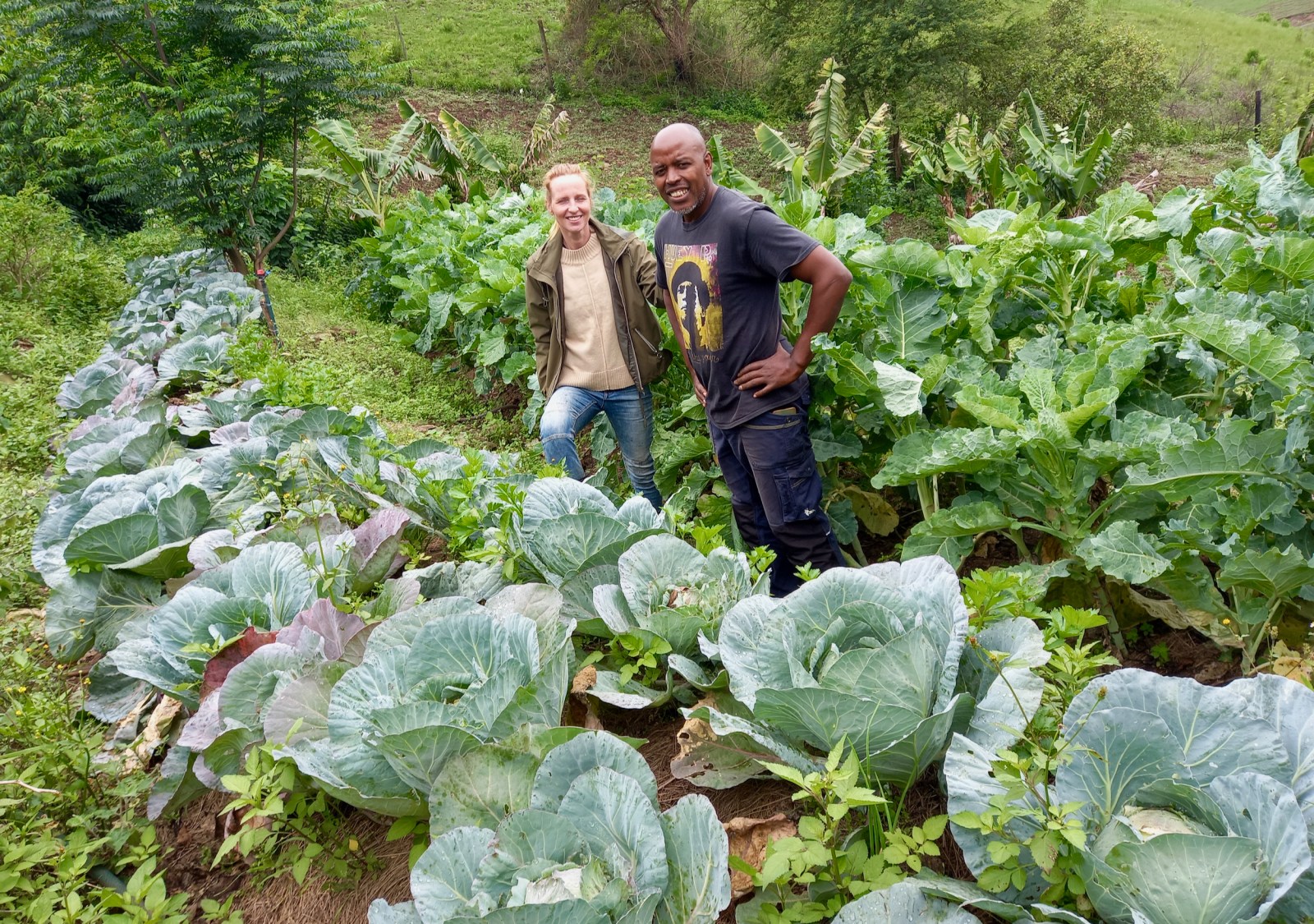
Prof Mvu Ngcoya, whose roots are in Phatheni and Linda Lazarczyková, from the Czech Republic, met in Durban and share commitment and roles at Bonakude. (Photo: Wanda Hennig)
Which brings us back, brought him back, to Phatheni. He was two years old when his parents relocated there after a history, dating back generations, of forced removals. Then in the 1990s, it was a flashpoint of ANC/IFP violence. You see the graves.
The trauma still weighs heavy, says Mvu.
“It is what I call home. My ancestral home. So when we wanted to farm, when my wife and I decided we wanted to grow our own food, it’s where we decided to do it.”
And named their project, their farm, Bonakude, the “bona” meaning to see, to visualise, and “kude” speaking to “far away” as in vision.
“So the way we interpret this is we’re seeing far into the future and far into the past. Borrowing from our ancestors and at the same time we’re not shy to borrow from the latest scientific research to take us into the future. And we’re also not shy to borrow from far in terms of geography.
“So our inspiration is Cuba, our inspiration is Mtubatuba. And now people are coming to us from faraway places and the community is beginning to think, ‘perhaps we matter. Perhaps what we’re doing matters’.”
Mvu remembers, “as a kid, a lot of the food we ate was coming from the land. So, how we got removed from producing our own food became an interesting question.” One of many.
Mtubatuba had been, for several years, his hands-on research site.
“Now it is here. Phatheni is where I bring my students. The research I’d been doing has become personal, in a way. The plot where we are farming has become a research site for me also.”
And, he will tell you, “It’s only now I’m older that I realise I’ve been a fool for so long because I didn’t see the resources Phatheni has. And the possibilities.”
Possibilities he is now trying to make real for the youth and larger community of Phatheni. Rooted in a seemingly straightforward philosophy: that to be in charge of your plate is to be in charge of your freedom.
What I am about to say may sound effusive, over-the-top. But s’truesbob, for me it was astounding to see what Mvu and his wife, Linda Lazarczyková, who is from the Czech Republic — they met in Durban — have created in four short years. They started cultivating the land “from scratch” a year before Covid hit.
“The miracle of Bonakude” is the phrase that kept popping into my head after they led me down the garden path from where I’d parked my car and through some arbour-like trellising. And there, before me, opened this flourishing vista of mountainside-clinging layerings of variety and abundance.
A place you can go not only for the great veggies and fruit and farm lunches but also for the equivalent of a masterclass in soil health and natural erosion measures, worm farming, seed preservation, medicinal plants, indigenous crops, beekeeping. You name it.
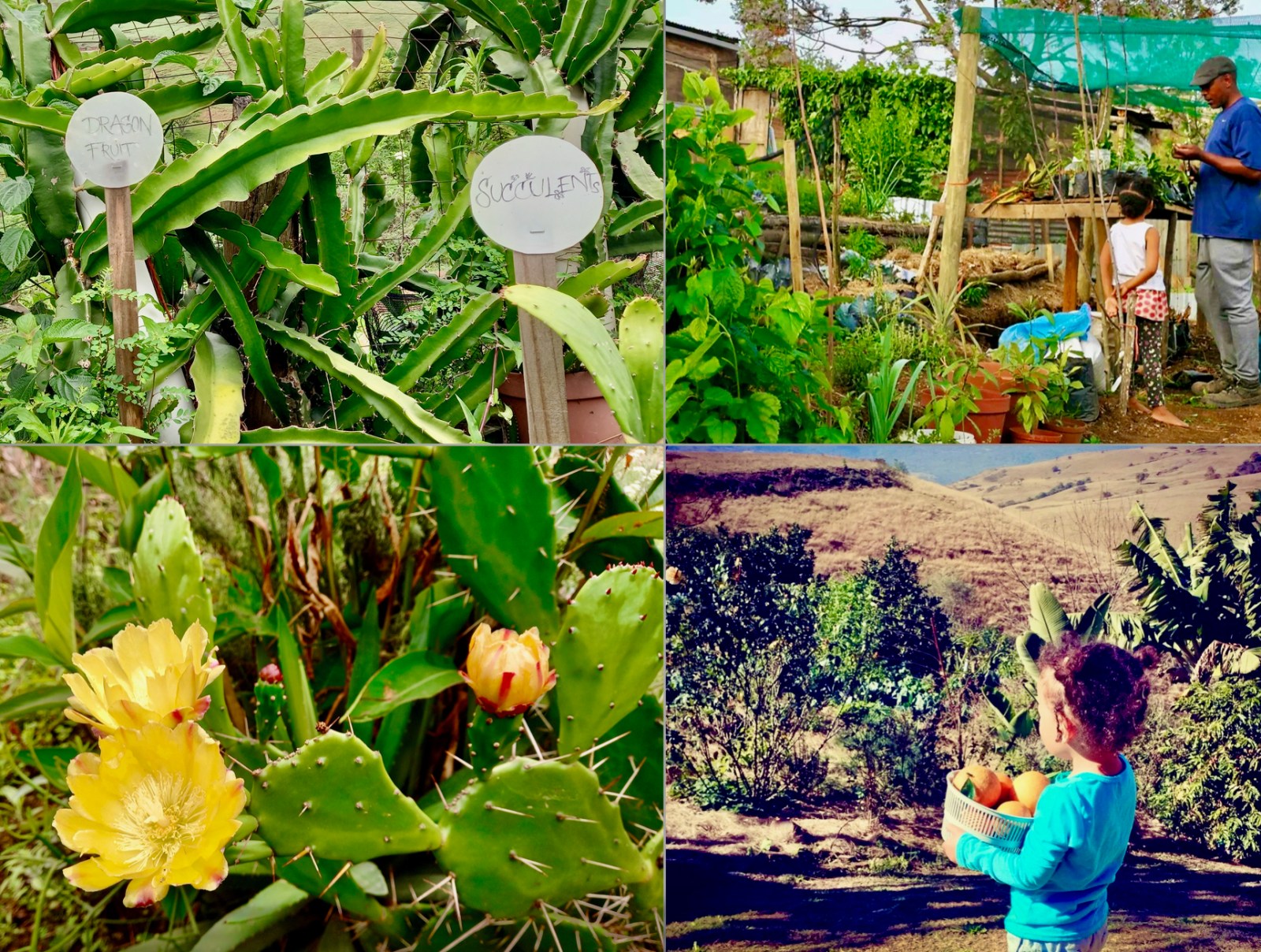
Clockwise from top left: the dragonfruit put in as an experiment and the succulents, like everything at Bonakude, curated and labelled; Mvu schools Halala (7) in Bonakude’s tree nursery; Mvu and Linda’s younger daughter, Nala (3) helps with farm boxes; a blossoming prickly pear, which has abundant health benefits. (Photos left: Wanda Hennig, right: supplied)
Mvu and I first connect at Durban’s Glenwood Bakery, his suggestion after, having followed Bonakude on Instagram for some months, I email him via the university to express my interest in knowing more.
Over coffee, he tells me some of what I’ve already shared. Plus, key to what they’re doing at Bonakude, that during his university sabbatical in 2018/19, he and Linda travelled with their then two-year-old daughter, Halala, to Cuba. Spent five months there. Drawn by his interest, academic and personal, in small-scale farming.
“Cuba has an amazing system where they have really tried to localise the control of the food system. Time and effort are spent aggressively supporting what they call family farms.
“So we spent a lot of time visiting and meeting with farmers in six of Cuba’s 11 provinces. Studying what they were doing and how they were doing it. And being blown away by what the small-scale farmer there is able to accomplish with limited resources.
“We spent time with this one guy who has about 13 hectares, a small-scale farm by global standards. We were there for 10 days and every morning, every lunchtime, every evening, when we were having a meal with the family, he was bragging that, this coffee, I grew it here. The milk for this coffee comes from those cattle. The bread you’re eating comes from my bananas, the porridge is from my maize, the fish is from my pond.
“That chocolate…” I wait for the expected rejoinder. “… is from the shop.” Mvu laughs.
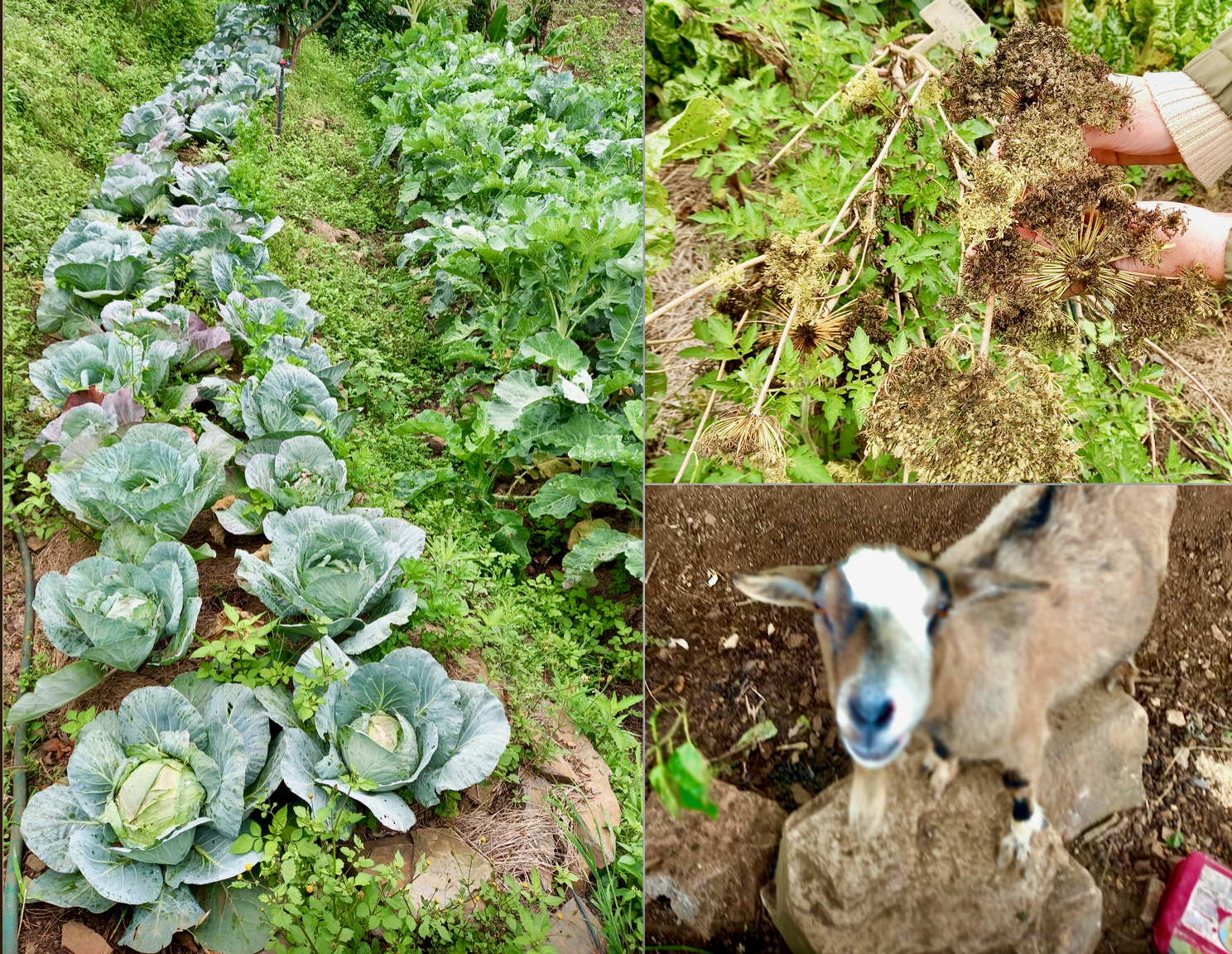
Left, of cabbages and kale; top right, Linda with carrots, gone to seed and ready for the seed bank; and Bloom, one of Bonakude’s Nigerian dwarf goats. (Photos/collage: Wanda Hennig)
“I swear, every meal, practically everything was from the farm, day in and day out. I could not believe it. That’s when Linda and I decided, when we go back home we need to do something, even if we do not reach 100 percent like this guy.
“So our job, up until now and going forward, is to increase the percentage of food we grow ourselves.”
The vision has expanded from growing food to growing people and growing community.
“Farming as a way of healing and recreating identity in this traumatised community.”
During that time of Covid total lockdown, “July madness”, Mvu calls it, it became clear that “you need to know where your food comes from. You need to be self-sufficient at the personal level. And you need to be self-sufficient at the community level.”
Before Cuba, there was a long-time closer-to-home role model and inspiration.
“I spent a lot of time with a genius farmer in northern KZN who passed away in 2020. This lady, Qho, was a spiritual mother to me and a great motivator because she was on the same path as Casimiro, the Cuban farmer, to grow as much of what you eat as possible.”
I find, via Bonakude on Instagram, where the posts are in turn informative, entertaining and inspiring, a link to an obit on Gogo Qho — “a herbal specialist and, most remarkably, a walking library of indigenous plants, nutrition and health” — written by Mvu and two collaborators.
And via UKZN (Sbeds) I find this video interview with Prof Mvu Ngcoya talking about education and transformation, what and how he teaches and how he uses food as a teacher. Referenced here, too, is Gogo Qho. Links are shared for readers who want to dig deeper.
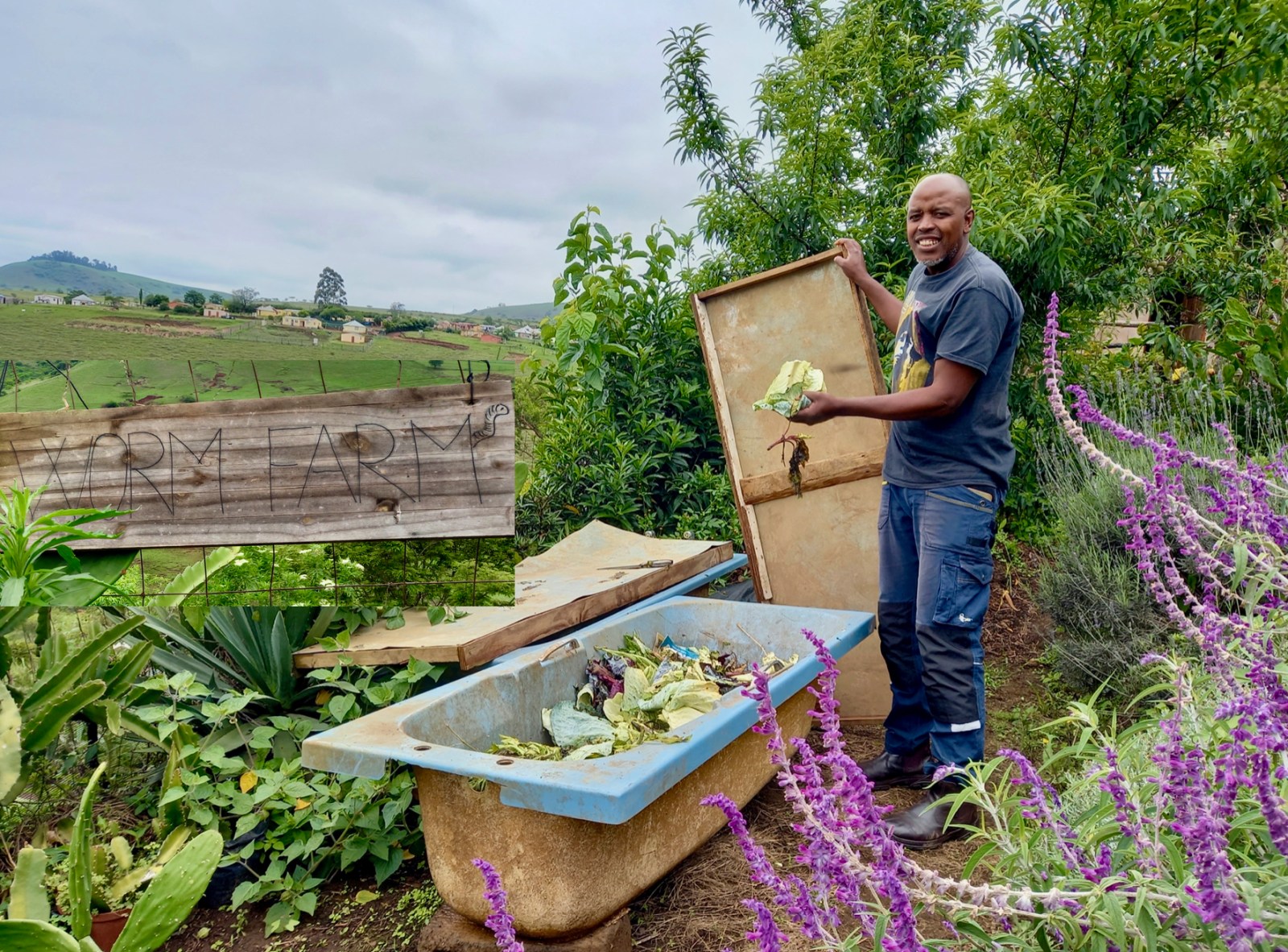
Soil quality is a priority so of course there is a worm farm, in combination with other regenerative and nature-inspired practices. (Photos/collage: Wanda Hennig)
My drive from Durban to Bonakude takes me via Richmond where Peter Nicholson grows his golden kiwis (read the story here), and on towards the Buddhist Retreat Centre (read the story here). Having written about these for TGIFood and thinking I know the area well, I take a wrong fork and am well on my way from Camperdown to Winkelspruit when Mvu gets my WhatsApp: “I have no idea where I am.” And academically replies, “Send me a pin.”
Almost an hour later I arrive at the correct turnoff to find him waiting in his vehicle at the start of the dirt road so I can follow him up, up, up, into the hills of Phatheni to Bonakude agroecological farm where Linda waits with coffee “not from our beans yet but yes, we have planted”.
Older daughter, Halala, (7) – her name translates as “a celebration” – offers to share from her bowl of just-harvested blueberries. And there is three-year-old Nala, which Mvu translates as “abundance, great harvest”.
Linda spills a pile of Cape gooseberries – “they just naturally grow” – onto the table, for us to husk and eat while we sit and talk under the outdoor kitchen shelter they have built for workshops, demos, farm visits and farm lunches. Including the one we will eat later, prepped by cook Busisiwe Khoza who for now is slicing red cabbage to ferment into sauerkraut.
This, same as other farm preserves, will be offered as an add-on to the farm boxes, ordered via WhatsApp and delivered every two weeks for pick-up at Savior Café in Glenwood.
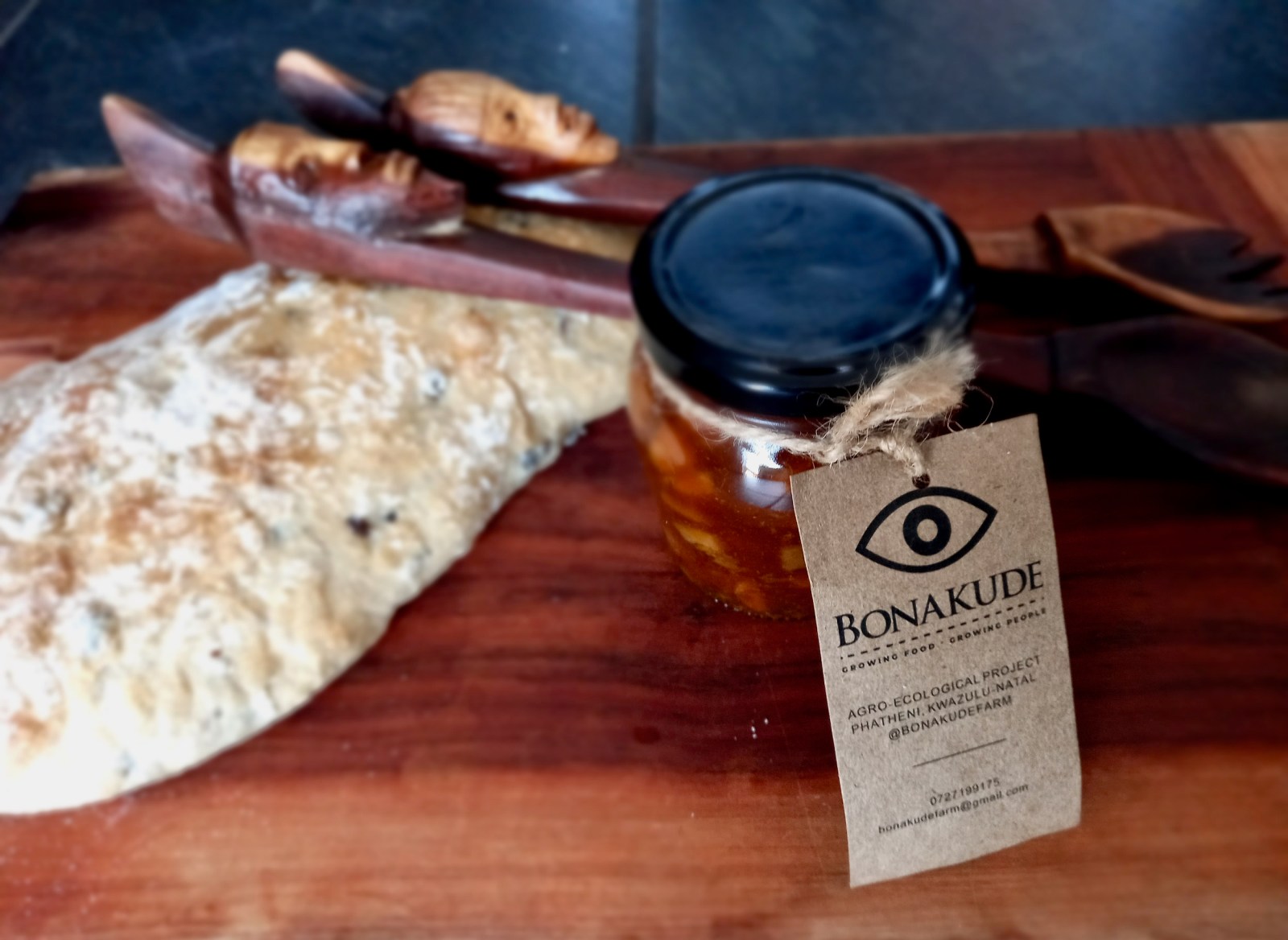
To make small-scale farming viable, thinking outside the box and diversification are key. Bonakude’s produce range is growing. Here, orange marmalade. (Photo: Wanda Hennig)
“You get at least 10 things,” says Linda. “For salads. Starchy, to cook. Pumpkiny. Leafy.” The plums and peaches now ripening on the trees. Add eggs. Perhaps orange marmalade. “We have the best-tasting oranges in the universe,” enthuses Mvu.
“We say ‘naturally grown’,” says Linda. Because, of course, as we all know, the word “organic” has become something of a farce and this is real food, growing with nature.
The boxes, usually driven to Durban by Mvu, are filled with freshness; whatever is ready for picking on the morning. Produce from Bonakude and any of the other five Phatheni farms that are part of the community collaboration they’ve set up.
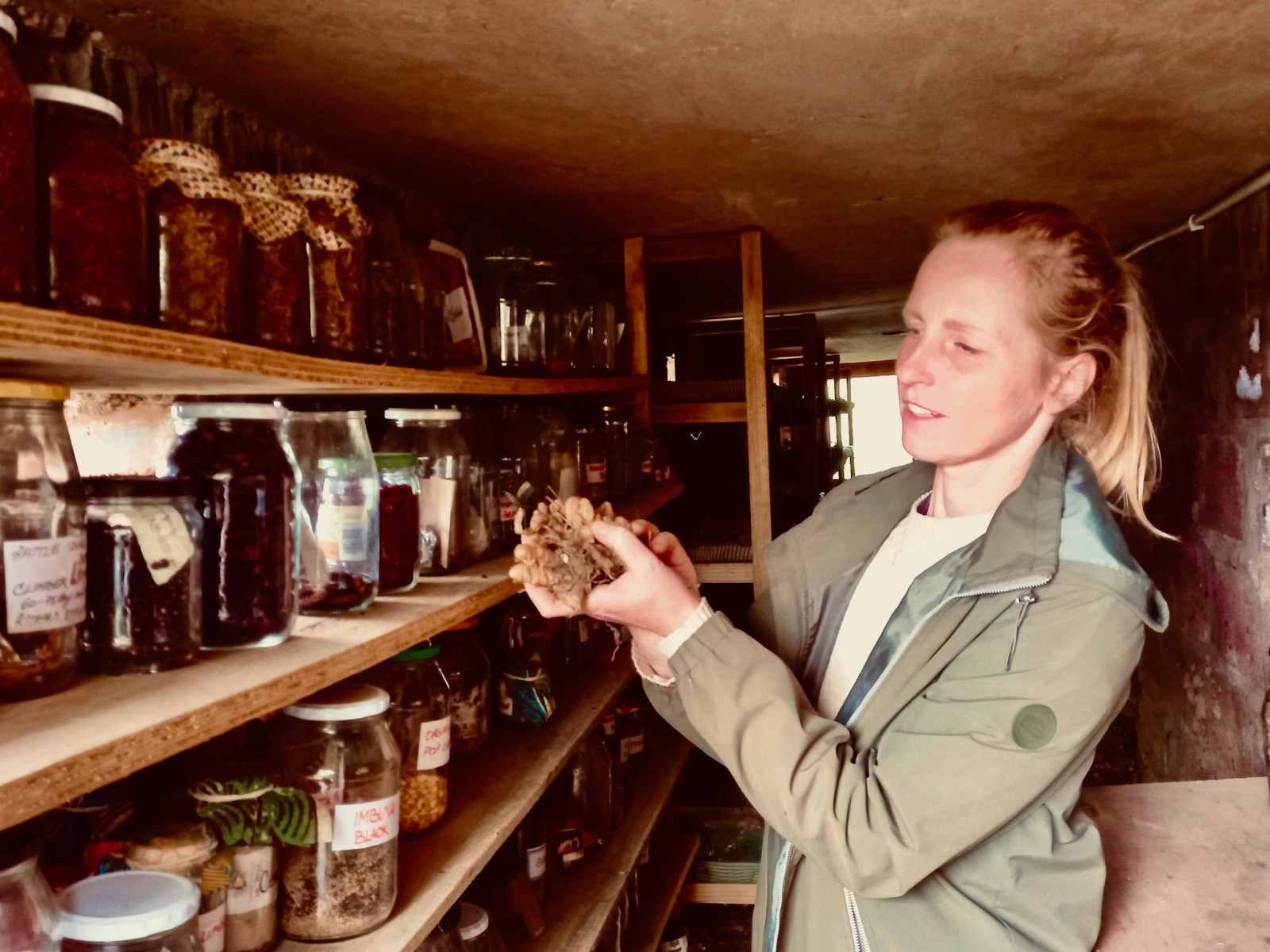
Linda Lazarczyková shows some drying turmeric in the capacious seed cellar built into the cliff beneath the valley-facing front of her and Mvu’s Phatheni house. (Photo: Wanda Hennig)
Then we go climb the fields, see the worm farm, the seed cellar, the seedling nursery, the tree nursery, the Nigerian pygmy goats, which have feta cheese production in their future, the chickens that sleep in the hen-house with the resident marmalade cat, the bee hives way down at the bottom of the valley.
For years, the valley was a trash dump before Mvu and Linda got permission from the traditional council to farm it and in 2019/2020 they cleared truckloads of rubbish, then set about the landscaping and erosion control using all manner of crops from banana trees “excellent for holding the soil” to a variety of indigenous soil-covers.
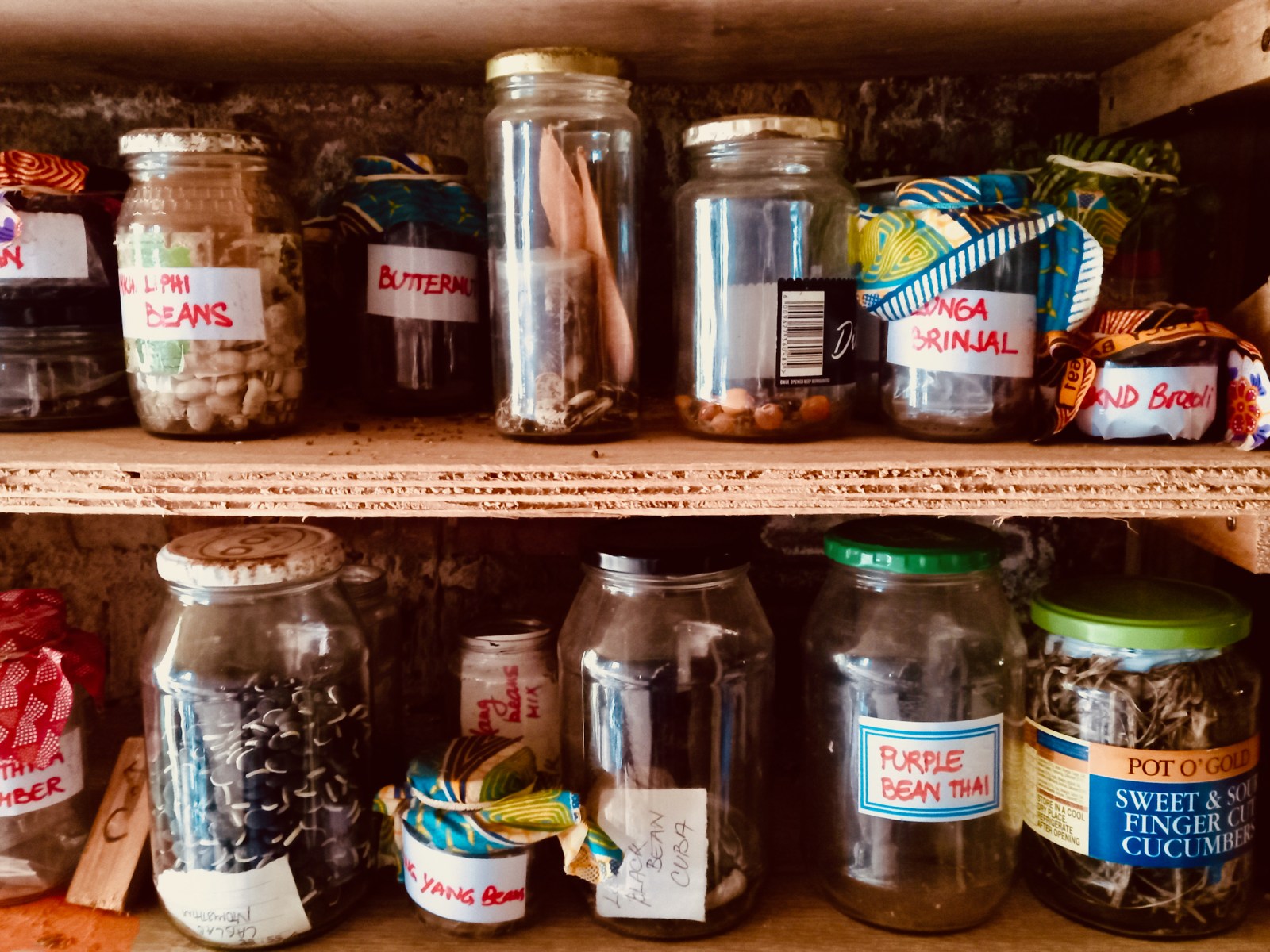
Saved seeds line the cellar. With seed preservation and sovereignty paramount, Bonakude has both a hands-on and a research focus. (Photo: Wanda Hennig)
No small-scale farmer will succeed alone, says Mvu. There is an interdependence.
For access to seed, for example, “You have to have your own seed bank but your seeds need to be diverse and spread out and you rely on other people who have different seeds, even if you have your own seeds.
“And if you keep your own maize seed in a bottle somewhere and suddenly it is attacked by a pest you’re not aware of, you need to have good relations with other people who have seed so that you can access their seeds.”
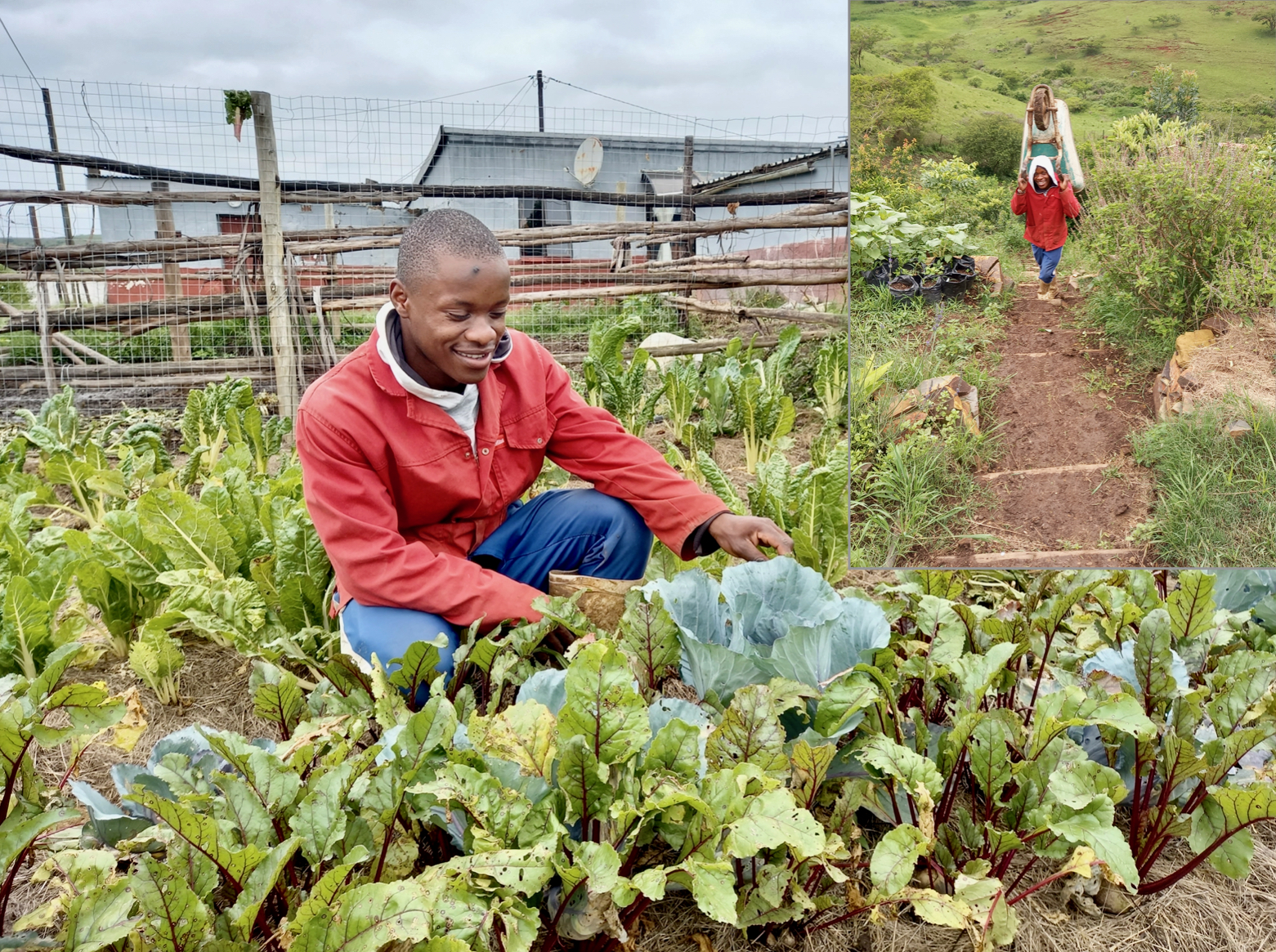
Near-neighbour Bheki Ndlovu at work in his own small plot, Ukwenzakeskho, and inset, Bheki at work in Bonakude’s steep fields. (Photos/collage: Wanda Hennig)
One of Mvu’s current research projects is what he calls “narrative agriculture”. Writing the stories the people of Phatheni tell about why they are farming.
“So that is my research now and I am using names as what you might call a crutch, the names people give their farms and properties, as their way of communicating with the world.”
So Bheki Ndlovu is a near-neighbour who went to help at Bonakude. He had a natural talent, was keen, interested, involved, so now he works there. And Mvu encouraged him to start farming crops on his own small plot so that he could also be self-sufficient and independent. And Bheki subsequently spoke to his neighbour, who had ground that had not been tended for years and got permission to regenerate the soil and grow crops there, too.
Bheki calls his farm Ukwenzakeskho, which he translates for me as “it’s your doing”. Tells me it relates to his philosophy that everything you do in your life involves choice.
“You can’t blame others.”
He also says that since he learned about soil and nutrition and farming with nature and the seasons, he’s eating better, feeling better, and his life has improved.
“So we’ve founded a network of farmers here at Phatheni. A community project. We call the network ilima, which is an ancient system of support. Elsewhere in the world, it’s called work rotation. Here, ours comprises a group of five farms. On a weekly basis, we go to each other for two hours and do what is necessary.
“Last time, Bheki wanted to build a chicken coop. So you are working and you’re also talking, advising, learning, studying. You’re not all on your own, in solitary confinement. You’re working with.”
Then, says Linda, “It’s heartbreaking to see these kids, right now, for example, going through exams and you know there is nothing on the other side.”
In response, they’ve introduced regular weekend community events to expose young people to possibilities.
“We had an artist come and give a workshop. And we had a spoken-word workshop. A weed workshop. A pasta-making workshop. A volleyball day. Others are planned and they are currently helping set up community soccer and raising funds for soccer balls.
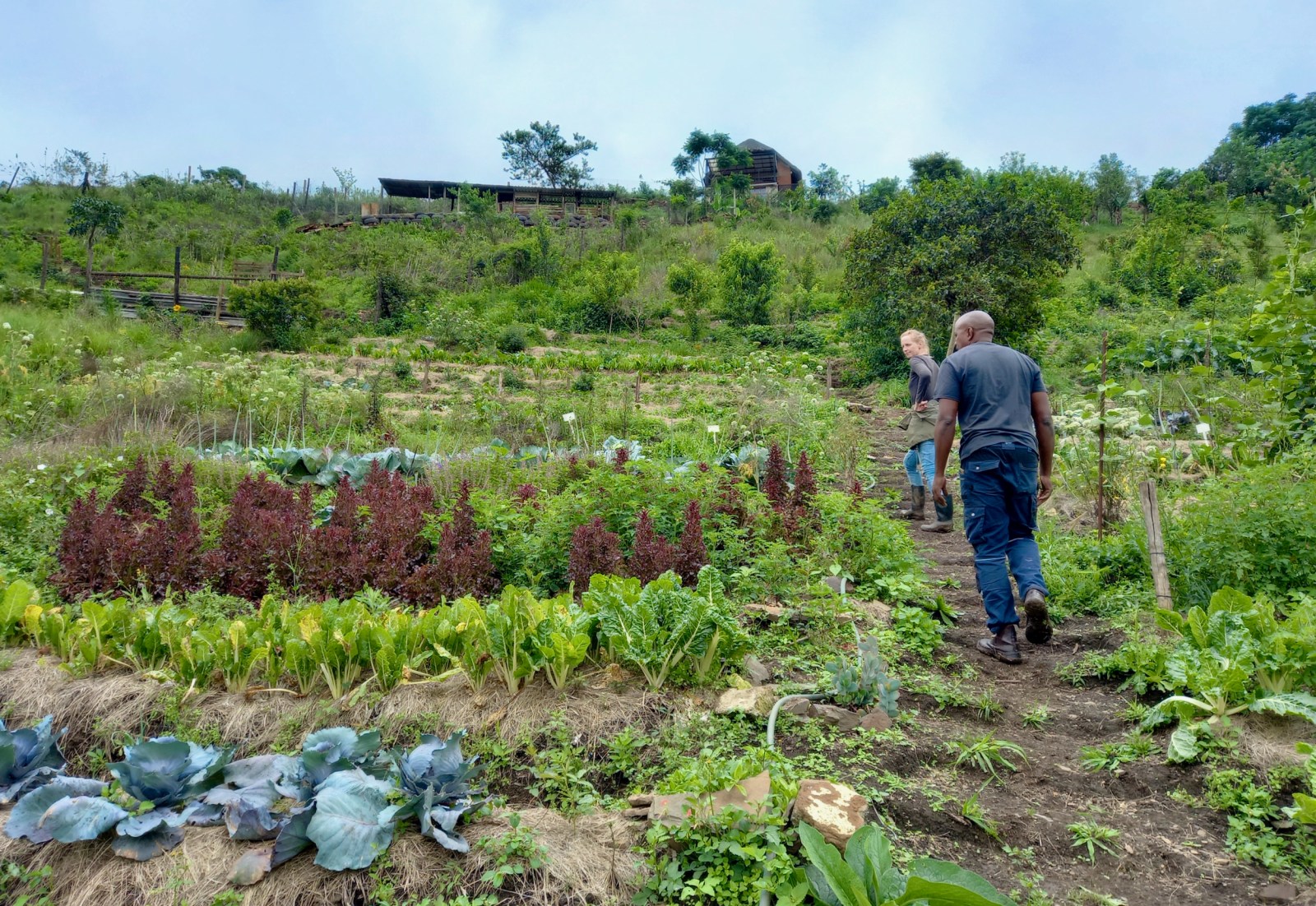
Instead of looking at the hectic nature of the slippery slope, Mvu and Linda remind themselves of the research they came across linking longevity to living on steep terrain. (Photo: Wanda Hennig)
Mvu is a trustee of Biowatch, an environmental justice NGO that works with smallholder farmers, other civil society organisations and government to ensure that people have control over their food, agricultural processes and resources within a biodiverse, agroecological and sustainable system.
“We recently participated in a seed festival they organised up in northern Zululand,” says Mvu.
“Through those connections, I now have a list on my phone of 30 to 40 like-minded people I can call upon. So that’s part of what we’re trying to do. Have our community network and then our broader network in Richmond.”
Then the network expands outwards to national conversations.
“So it’s that kind of nest-egg thing, because it’s impossible to do a lot of things around food sovereignty alone.”
Watch out for the recently released Biowatch collaboration, The Last Seed, a documentary about the struggle for control of seed in Africa. An exposé of the devastating consequences of the corporate control of farmer seed and our food system.
And shouldn’t we all be advocating for a school curriculum that includes nutrition and agricultural practices? Be in charge of your plate, be in charge of your health. Isn’t that a path to freedom? DM
Follow Bonakude on Instagram, e-mail [email protected]. Visit Biowatch online.
Follow Wanda on Instagram @wanda_hennig_new





 Become an Insider
Become an Insider
Bonakude is the only way.